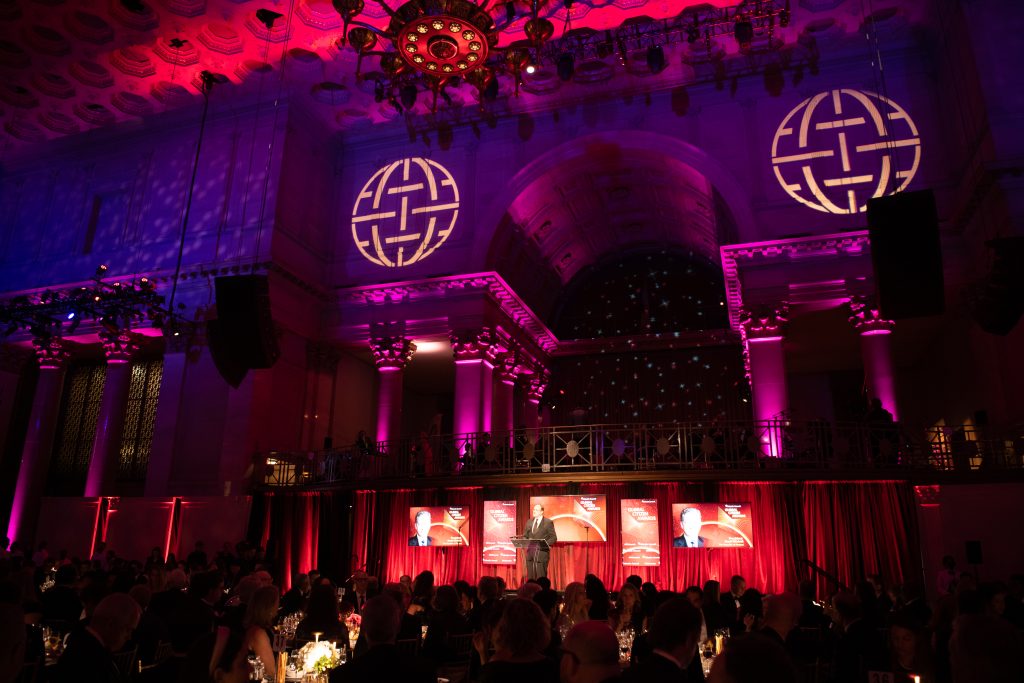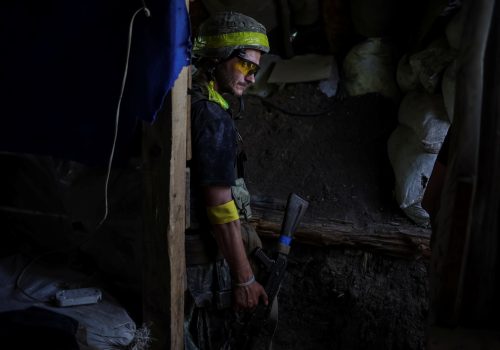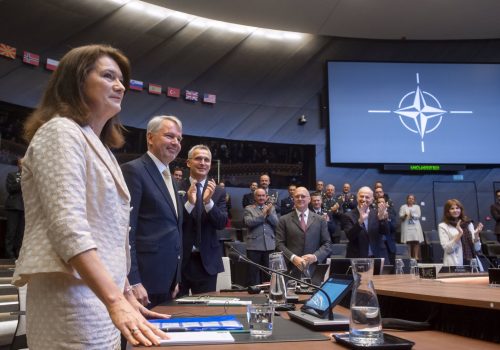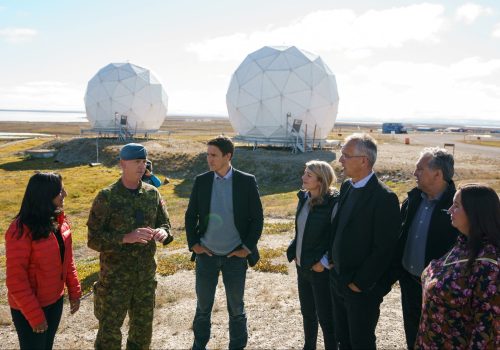Since the Atlantic Council last held its Global Citizen Awards in 2019, upheaval from the pandemic to Russia’s war in Ukraine has profoundly threatened the world order—and changed the nature of global citizenship. Monday’s awards ceremony in New York, on the sidelines of the United Nations General Assembly, reflected a world newly reshaped by conflict. It honored those who have leapt into action in response to crises in Ukraine and beyond in order to strengthen transatlantic ties, provide humanitarian assistance, and forge peace.
Finnish President Sauli Niinistö and Swedish Prime Minister Magdalena Andersson launched national bids to join NATO, shedding long histories of military non-alignment in their countries. Indonesian President Joko Widodo is advocating for inclusive global prosperity and leading the Group of Twenty (G20) nations—who will meet in November in Bali—all while trying to build bridges to peace in Ukraine.
Meanwhile, Google and Alphabet CEO Sundar Pichai led the company’s efforts to respond to Russia’s aggression and support refugees and displaced people throughout the world. And Forest Whitaker, an Academy Award-winning actor and UNESCO special envoy for peace and reconciliation, is empowering the next generation of peacebuilders.
The gala also recognized the efforts of two great leaders that the world lost this year. Former Japanese Prime Minister Shinzō Abe, who was assassinated in July, bolstered Japan’s standing in its region and well beyond. And the United Kingdom’s longest-serving monarch, Queen Elizabeth II, who passed away earlier this month, spent her life leading Britain through grave global challenges and nurturing her country’s relationship with allies like the United States.
With the gala taking place just hours after the queen’s funeral, several speakers reflected on the poignant scenes in London and the experience of millions around the world who paused to watch the ceremony. Atlantic Council President and CEO Fred Kempe said the outpouring represented public hunger not just for the continuity of the monarchy itself, but for “continuity of purpose” as well. “The continuity of purpose and the solidity of institution is what we hope we’re celebrating here—alongside the fact that we’re celebrating some quite remarkable honorees,” Kempe added.
Watch a playlist of the evening’s speakers
Here are more highlights from the gala:
Sauli Niinistö: Finland’s NATO membership is a “true triumph of democracy”
- Reflecting on the past seven months, marked by the transatlantic community’s “unified and unwavering” support of Ukraine and historic steps to enlarge the Alliance, the Finnish president boasted in pre-recorded video remarks that the transatlantic bond “not only remains strong; it is becoming ever stronger.”
- Niinistö explained that, throughout his political life, he found it “fundamentally important” to anchor Finland in the transatlantic community as a “close partner of NATO.” But, he remarked, Finland has now taken a “necessary step” by becoming an Alliance member. Niinistö added that Finland is serious about its membership. “We will commit to the security of the whole Alliance, to the security of all allies,” he said.
- “Shaping our global future together is now more vital than ever,” Niinistö said. In Ukraine, he added, the transatlantic community “will continue to defend our values and the foundational principles of democracy.”
- Niinistö called upon allies to take a “serious look” at global supply chains and critical industries to address the economic consequences of the war and “boost our resilience.” Niinistö argued that allies will need to “keep up” with emerging technologies like artificial intelligence, quantum computing, and biotechnologies—and the standards used to govern those technologies. “We need to ensure that technology will be developed and used in line with our values,” he said.
- As the world “grows more and more insecure and divided,” Niinistö explained, it is “imperative” that the United States and Europe “come even closer together.” He added: “Yes Europe needs the US, but the US also needs Europe.”
- Finnish Foreign Minister Pekka Haavisto accepted Niinistö’s award on his behalf and took the opportunity to praise transatlantic partners for being “extremely united” during Russia’s invasion. “We need to remain resilient and keep on strengthening the transatlantic cooperation,” Haavisto added.
Swedish foreign minister: “You can count on us” to be “committed allies”
- Swedish Foreign Minister Ann Linde, accepting the award on Andersson’s behalf, explained how the prime minister “benefited early on from the transatlantic spirit” as a student in the United States in the 1990s. Following Andersson’s resignation last week following Sweden’s elections, Linde looked back on the prime minister’s tenure: “Her transatlantic mindset has been a great asset for her as prime minister and the first woman to hold Sweden’s highest political office.”
- Linde reminded the audience that Russia’s war in Ukraine echoes “the darkest days of European history”—and that in addition to Ukrainian lives and the country’s sovereignty, “the entire international system” that was formed after World War II is at stake as well. For Sweden, seeing Russia’s aggression was “a watershed moment,” said Linde.
- Sweden’s decision to apply for NATO membership, which has been ratified by twenty-seven of thirty members, is momentous in part because it marks “the end of more than two hundred years of neutrality and nonalignment,” Linde explained. With members-to-be Sweden and Finland, who are “champions of freedom, peace and prosperity, and human rights” and who have sophisticated defense capabilities, “NATO will also be stronger,” she said.
- Linde argued that the “tragedy unfolding in Ukraine” also “offers a glimmer of hope,” as it has revitalized and strengthened both the European Union—with unity on sanctions and movement toward admitting Ukraine and Moldova—and the transatlantic relationship. “Transatlantic cooperation is our best tool for tackling pressing common and global challenges,” Linde told the audience.
A tribute to leaders that have changed the world: Shinzō Abe and Queen Elizabeth II
- The Queen Elizabeth tribute so moved Dame Karen Pierce, the British ambassador to the United States, that she took the stage in a surprise appearance. “Thank you, America,” she said. “Thank you, Atlantic Council. Thank you for being the closest of allies. Thank you for recognizing the place the queen holds not just in our hearts, not just because of her friendship with America—and I’m going to include horses in that, in case there’s anyone from Kentucky—but also what she has represented in the world.”
- “The greatest service we can do to her memory and those of the presidents she’s met [is] to continue this network of democratic values, this sense that we make a choice—we choose freedom, we choose consensus, we choose open debate,” Pierce added.
Joko Widodo: What’s important is “a peaceful, fair, and prosperous world”
- Widodo, who’s been in office since 2014, dedicated his award to the people of Indonesia who “have persevered in facing… many challenges.”
- Widodo told the audience in pre-recorded video remarks that, much like other developing countries, Indonesia is facing domestic challenges coupled with global challenges such as “climate change, health crisis, food crisis, energy crisis, and financial crisis.” To tackle them, the world will need to make a “strong commitment, as well as accurate and effective policies,” Widodo stressed.
- Widodo pledged to continue to promote international cooperation “that upholds mutual peace and prosperity.” He vowed to use the G20 presidency to push the world’s leading countries to develop a “resilient global health architecture” and foster “inclusive and sustainable growth.”
- Accepting the award on Widodo’s behalf, Retno Marsudi, Indonesia’s minister of foreign affairs, said her nation seeks a different course. “In [a] world where pessimism abounds, Indonesia wants to inspire hope and confidence,” Marsudi said. “In [a] world that is divided, Indonesia strives to become a bridge builder. And in [a] world full of challenges, Indonesia is determined to be part of solutions.”
Sundar Pichai: “We must remain optimistic about the power of technology to improve lives”
- Pichai told the stories of people who have been “working tirelessly” to help Ukrainians facing “unspeakable hardship,” including an entrepreneur offering free online mental-health services and a Polish journalist running a Ukrainian-language science channel to maintain refugee children’s education. He also explained how a young Ukrainian child used Google Translate to build friendships at her new school in Poland. “The need is unprecedented,” Pichai said. “And so is the response.”
- As communities across the United States welcome refugees from Afghanistan, Ukraine, and beyond, Pichai reminded the audience that “the private sector can scale these efforts and fill gaps with technical expertise, resourcing, and innovation.” He detailed ways Google has worked to do that with more than forty-five million dollars in grants, thirty thousand hours of employees’ time, and other product-based support.
- As an immigrant from India, Pichai said that he feels compelled to “work even harder” to support refugees who, unlike him, have been forced to relocate. The opportunity to make people feel welcome, he explained, is one of the reasons why he is co-chairing the CEO Council for Welcome.us, a nonprofit that helps Afghan and Ukrainian refugees in the United States as they resettle and search for jobs.
- “The goal is to create solutions that can be repeated and scaled,” said Pichai. This will become increasingly important, he added, given the displacement caused by “climate change, food security, and economic uncertainty.”
- Pichai believes that the world has a responsibility “to ensure people everywhere can benefit from the opportunities technology creates” by, for example, improving access to technology and ensuring the internet remains free, open, and safe. It will also be important to address “the challenges of disinformation, cyberattacks, and other harms,” he explained. “I’m excited about the partnerships we’ve formed to do that across business, government, and civil society.”
Forest Whitaker: “Our shared quest for peace is an urgent one”
- The star of such films as The Last King of Scotland (in which he played Ugandan dictator Idi Amin) and The Butler, Whitaker dedicated his award to the young people in his Whitaker Peace & Development Initiative, which trains people who live in societies under “the grip of conflict” in peacebuilding, conflict resolution, mediation, and more.
- War and violence, Whitaker reminded the audience, happen not only in places like South Sudan and Ukraine, but also “countless areas that don’t make it to the headlines.” Conflict in all its forms is “stealing from young people their innocence and their lives,” he cautioned.
- Whitaker explained that peace is more than “simply the absence of violence,” recounting an encounter with an aid worker in Uganda who had just helped a former child soldier return to his family. Upon returning home, the child killed his eight-year-old sister. “That boy had been removed from war, but he never knew peace,” Whitaker explained. “And so the cycle of violence resumed.”
- A “more complex understanding of peace requires so much more of us,” said Whitaker, explaining that in the world’s most conflict-ridden areas, people subject to and inflicting violence will need to heal from trauma, learn to communicate effectively with one another, and work to meet basic needs. They’ll also need the “ability to aspire” and believe that they can work to achieve their dreams.
- “It’s something we can—and must—actively work towards together,” Whitaker told the audience, adding that “no matter where you are, you can help support efforts” to build lasting peace. That can take the form of standing up against wrongdoing, using your platform to call attention to injustices, or starting or joining peacebuilding organizations. And Whitaker implored the audience to “simply spread compassion.” Peace, he noted, “can begin with something as small as a smile.”
Katherine Walla is an assistant director of editorial at the Atlantic Council.
Daniel Malloy is the deputy managing editor at the Atlantic Council.
Further reading
Tue, Aug 23, 2022
Six months, twenty-three lessons: What the world has learned from Russia’s war in Ukraine
New Atlanticist By
Our experts break down how this conflict has transformed not only military operations and strategy, but also diplomacy, intelligence, national security, energy security, economic statecraft, and much more.
Mon, Aug 8, 2022
When will Sweden and Finland join NATO? Tracking the ratification process across the Alliance.
New Atlanticist By
With this tracker, the Atlantic Council team is keeping tabs on the countries that have ratified the amended NATO treaty—and handicapping the political prospects for ratification in the rest.
Wed, Aug 31, 2022
The war in Ukraine is an opportunity to upgrade the transatlantic architecture. Here’s how.
New Atlanticist By
Atlantic leaders should treat the current conflict—just as they did the Cold War—as an opportunity to improve institutional capabilities.



